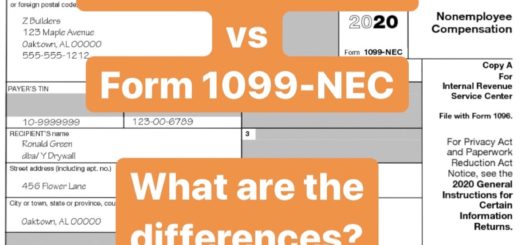
Hello. It looks like you’re using an ad blocker that may prevent our website from working properly. To receive the best experience possible, please make sure any blockers are switched off and refresh the page.
If you have any questions or need help you can email us

How to Get a Tax Break for Temporary Work Assignments
The IRS often views business travel expense deductions with a healthy dose of skepticism. Consult with your professional tax advisor to ensure you’re on firm ground.
Ken Berry, JD
Sep. 12, 2023

If you travel away from your tax home on business in your vehicle, you can deduct your gas and related expenses. However, you generally can’t write off the regular expenses of getting back and forth from work, even if you travel a long distance each day. The IRS considers this daily commute to be a nondeductible personal expense.
Conversely, suppose you’re working on a project that takes you far away from home for several months. In that case, you may qualify for a special tax law exception if this temporary assignment lasts less than one year. As a result, you may be able to deduct your travel expenses between your home and the temporary job site.
However, if the assignment lasts indefinitely, you won’t qualify for deductions under this special tax law exception. It all has to do with the way the IRS defines your “tax home” and “temporary assignments” for tax purposes. Let’s take a closer look.
Basic rules : If your assignment or job away from your main place of work is temporary, your tax home doesn’t change. You’re considered to be away from home for the entire period while you’re away from your main place of work. Accordingly, you can write off your travel expenses if they otherwise qualify for deductions.
Generally, a temporary assignment in a single location is one that is realistically expected to last (and does in fact last) for one year or less. However, if your assignment or job is indefinite, the location of the assignment or job becomes your new tax home. Thus, you can’t deduct your travel expenses while you’re there.
An assignment or job in a single location is considered indefinite if it is realistically expected to last for more than one year—whether or not it actually lasts for more than one year.
If your assignment is indefinite, you must include in your income any amounts received from your employer for living expenses, even if they are called travel allowances and you account to your employer for them.
Note : Previously, employees could personally deduct unreimbursed travel expenses as miscellaneous expenses, subject to a floor of 2% of adjusted gross income (AGI). But the Tax Cuts and Jobs Act (TCJA) suspends the miscellaneous expense deduction for 2018 through 2025. Thus, this is not currently an option, regardless of AGI.
Finally, remember to carefully observe the rules stated above and keep the requisite records to back up your claims. If you handle things the right way, you may even be able to deduct your travel expenses of coming home on the weekend after spending the workweek at a temporary job site.
Caution : The IRS often views business travel expense deductions with a healthy dose of skepticism. Consult with your professional tax advisor to ensure you’re on firm ground.

ABOUT CPA PRACTICE ADVISOR
- Cookie Policy
- Terms & Conditions
Magazines & Newsletters
- Magazine Archive
- Newsletters
Join for free!
CPA Practice Advisor is your technology and practice management resource for the accounting profession, giving you personalized access to the latest news, accounting-related events, and expert commentary across all of our channels, including website, whitepapers, newsletters, podcasts, social media, and our annual conference – Ensuring Success.
Join for free
CPA Practice Advisor is registered with the National Association of State Boards of Accountancy (NASBA) as a sponsor of continuing professional education on the National Registry of CPE Sponsors.
© 2024 Firmworks, LLC. All rights reserved

10 min read
Deductions for temporary out-of-town work assignments.
Submitted By: admin on Sep 8, 2016 3:28:25 PM

The general rule for out-of-town business travel expenses is that you can deduct them as long as the work assignment is “temporary.” (This includes transportation to and from a work site, lodging, 50 percent of meal costs, and so forth.)
On the other hand, if the work assignment is not temporary , your tax home is considered to shift to the work location, and your travel expenses are then considered to be non-deductible personal outlays. In one recent decision, the U.S. Tax Court found in favor of the taxpayer on this issue, which can affect employees who pay their own expenses (without reimbursement) and self-employed taxpayers.
Before getting to the decision, let’s first cover the basics on out-of-town business travel expenses.
Deduction Basics
When you travel away from your tax home overnight on business, you can deduct the round-trip transportation cost (for example, car expenses or airfare and parking), plus 100 percent of lodging costs for business days, plus 50 percent of meal costs for business days, plus 100 percent of incidentals (such as dry cleaning costs) for business days.
Your tax home is located at:
1. Your regular place of business or your principal place of business if you have more than one regular place of business; or 2. Your regular abode if you have no regular or principal place of business.
The purpose of allowing deductions for out-of-town business travel expenses is to give you a tax break for all the duplicative expenses incurred while at the temporary work location. However, an itinerant worker (such as a traveling salesman or self-employed casualty insurance adjuster who moves from one disaster site to the next) doesn’t have any tax home and therefore does not have any duplicative expenses. As a result, itinerant workers can only deduct transportation costs between work locations (no deductions for lodging, meals, and incidentals).
In general, an out-of-town work assignment at a single location is considered to be temporary, which is a prerequisite for deducting travel expenses, if it is realistically expected to last one year or less and does in fact last that long. If an away-from-home assignment is realistically expected to last more than one year, or there’s no realistic expectation that it will last one year or less (such as an assignment with an indefinite term), the assignment will be treated as indefinite regardless of how long it actually lasts. In this scenario, the travel expenses are non-deductible.
Of course, expectations can change. If so, the worker will not be penalized under these rules. For example, if an initial eight-month assignment is extended for six additional months, the assignment is treated as no longer being temporary when it is extended. But travel expenses for the first eight months can still be deducted, because the assignment was temporary during that period.
Instead of keeping records of actual expenditures for lodging, meals, and incidentals while out of town on business, an employee can choose to deduct a fixed daily (per diem) IRS-approved amount (subject to the 50 percent allowance rule for the portion of the per diem that is allocated to meals). More specifically, the per diem amount can be deducted regardless of actual expenditures for lodging, meals, and incidentals as long as the employee is able to prove with adequate substantiation the time, place, and business purpose of the travel. While receipts are not required to prove expense amounts when using the per diem method, you may find it convenient to keep lodging receipts (which conclusively prove the dates and places of your travel) on which you note the business purpose for the travel.
Key Point: The IRS-approved per diem rates can be found on the General Services Administration’s website at www.gsa.gov/perdiem .
Finally, employees must treat unreimbursed business travel expenses as a miscellaneous itemized deduction item. If the travel expenses, when combined with other miscellaneous itemized deduction items (such as investment expenses, fees for tax preparation and advice, and union dues), exceed 2 percent of the employee’s adjusted gross income, the employee can deduct the excess.
Recent Tax Court Decision
In a 2014 case, the Tax Court concluded that the taxpayer’s six-month out-of-town work assignment was indeed temporary, which allowed him to deduct his business-related travel expenses. However, his claimed deductions were reduced because he failed to keep adequate records of all his expenses.
Facts of the case: Roj Carl Snellman was married and lived in Florida. In late May of 2009, he began work as a project manager at a job site in Missouri. His assignment was to manage the development of a system to track a company’s customer credit card payments. While the company paid Snellman a salary equivalent to $90,000 a year, the project was expected to be completed by the end of 2009, at which point his employment would end. Snellman wasn’t reimbursed for any work-related expenses, so his out-of-town expenses came out of his own pocket.
Snellman drove from his home to the Missouri work location and stayed in a hotel from May 25, 2009 through June 10, 2009. On June 11, he signed a lease to rent an apartment for $525 per month through December 31, 2009. As it turned out, the company experienced financial difficulties, and Snellman’s employment was terminated early on November 2, 2009. He drove back home to Florida about two weeks later.
On their joint 2009 federal income tax return, Snellman and his wife claimed car expenses of $4,060 plus $27,200 for lodging, meals, and incidentals (based on the applicable per-diem rate of $170). After auditing his 2009 return, the IRS disallowed all of these deductions on two grounds:
First, the IRS claimed that Snellman’s tax home was in Missouri for the entire time he was there, which meant he wasn’t entitled to any business travel deductions because he wasn’t away from home. Second, the IRS disallowed his travel deductions due to inadequate substantiation.
Snellman took his case to Tax Court where he was rewarded with an opinion that was partly in his favor. Specifically, the court agreed with Snellman that his tax home in 2009 was in Florida rather than Missouri, which was a prerequisite for deducting travel expenses. Snellman credibly testified that he was hired to work in Missouri as a temporary project manager for approximately seven months, and that the employment actually lasted for only six months. His testimony that his employment was temporary, as opposed to indefinite, was corroborated by the fact that his Missouri apartment lease was scheduled to expire on December 31, 2009 and that he negotiated an addendum to the lease agreement to allow for early termination on short notice if his employment ended sooner than expected.
However, the Tax Court reduced Snellman’s claimed deductions because he didn’t maintain the required records. He didn’t keep a contemporaneous log of his business-related car mileage, and he didn’t properly keep track of the dates and business purpose for his lodging expenses. Had he kept good records, he would have won a total Tax Court victory. ( Roj Snellman, T.C. Summary Opinion 2014-10)
What Other Taxpayers Can Learn from the Case
The Snellman decision illustrates that failure to keep adequate records for out-of-town business travel expenses may mean the IRS will completely deny your claimed deductions. You may have to go to Tax Court if there is really no doubt that you are entitled to at least some deductions. As stated earlier, Snellman would have won a complete victory in the Tax Court if he had kept good records, and he could have avoided the entire issue if he had done so. If you have questions or want more information about keeping records of business travel expenses, consult with your tax adviser.
Ready, Set, Retire
May 2, 2024
Have you given any thought to your retirement? Even if you don't expect to retire anytime soon, the earlier you start...
Making a Loan to a Family Member to Help with a Home Purchase
Apr 30, 2024
Interest rates on residential mortgage loans have increased significantly over the last few years. If your adult child...
Temporary Employment Tax Deductions
- Human Resources
- Employee Relations
- ')" data-event="social share" data-info="Pinterest" aria-label="Share on Pinterest">
- ')" data-event="social share" data-info="Reddit" aria-label="Share on Reddit">
- ')" data-event="social share" data-info="Flipboard" aria-label="Share on Flipboard">
Tax Deduction for Commuting Miles to a Second Job
What can i write off if i work from home, what are the rules for travel pay in the army national guard.
- The Tax Advantage of Leasing a Car if Self-Employed
- Auto Mechanic Tax Deductions
When you don’t hold a permanent position within a company but instead take on temporary work, there are a number of tax deductions you can claim to reduce what you owe to the Internal Revenue Service. However, how you report your deductions depends on whether you’re classified as a temporary employee or as an independent contractor, as explained on the IRS website. The main distinction between an temporary employee and a contractor is that a contractor is considered self-employed.
Tax Return Differences
As a self-employed taxpayer, you file a Schedule C or Schedule C-EZ with your tax return. These forms calculate your net profit from self-employment, which is essentially the gross amount you earn during the year from temporary contract work – which frequently is reported on 1099-MISC forms – minus all the expenses you incur that relate to doing that work. As a temporary employee, however, you receive a W-2 from each employer, but you don’t fill out a Schedule C. Instead, you can itemize your deductions on Schedule A to take advantage of any unreimbursed employee expense deductions. In addition, you may need to file a Form 2106 or Form 2106-EZ to report certain deductions such as the mileage you put on your car when traveling for business purposes.
Temporary Assignments: Relocations
If you accept a temporary work assignment that isn’t near your home and need to relocate for a while, many of the expenses you incur related to the relocation are deductible regardless of whether you’re a temporary employee or contractor, as discussed in Publication 463 . As long as the assignment is for no more than one year, you should deduct the cost of traveling to and from the new location. Other temporary work assignment tax deductions include the expense of hotels and temporary apartments, the costs associated with shipping your personal effects to the temporary location and even some of the meals you purchase while away from home.
Home Office Deductions
Temporary employees and contractors don’t always have a place to go to work each day and are sometimes on their own. If the company you’re doing work for doesn’t provide workspace and you consistently work at home, you may be eligible for a home office deduction. To take this temporary employment tax deduction, you must use an area of your home exclusively and regularly to complete your work, whether it entails meeting with clients or simply working on your computer each day.
Other Common Deductions
For most work-related deductions, the temporary nature of your employment and contract work is irrelevant. Some of the other tax deductions for temporary workers commonly take include the cost of purchasing and cleaning required uniforms, tools and equipment you own that are used in the temporary employment and all or part of your cell phone bill if you frequently make business-related calls.
One big deduction available only to contractors is for half of the self-employment taxes paid. These taxes are the same Social Security and Medicare taxes that employees pay for both permancent and temporary workers. Because you don’t have an employer to pay half these taxes for you, the IRS lets you take the deduction instead.
- Internal Revenue Service: Self-Employed Individuals Tax Center
- Internal Revenue Service: Form 2106
- Internal Revenue Service: Publication 463
- Internal Revenue Service: 2020 Instructions for Schedule C
Related Articles
What deductions can i claim as a truck driver, working at a job that doesn't take out taxes, can i write off my lunch if i am self-employed, commuting miles vs. business miles, differences between owner-operators & subcontractors, how is an independent contractor different from an employee, if i am collecting unemployment, and accepted a 1099 position, how will that effect my unemployment, what is a freelance contracted employee, the average miles for a real estate agent per year, most popular.
- 1 What Deductions Can I Claim as a Truck Driver?
- 2 Working at a Job That Doesn't Take Out Taxes
- 3 Can I Write Off My Lunch if I Am Self-Employed?
- 4 Commuting Miles vs. Business Miles
- Job Seekers
- Why Indeed Flex?
- How the app works
- Roles and Industries
- Benefits and Pay
- Meet the community
Marketplace
Instantly access a high quality, pre-verified workforce on demand
Manage your entire supply chain within a singular platform
Technology and Features
Effortlessly manage, attract and retain talent through a variety of features
- Workforce Scheduling
- Workforce Management
- Tracking and Attendance
- Internal Workforce Management
- Ratings and Worker Pools
- Agency Management
- Reporting and Analytics
- Smart Job Offering
Discover and retain talent across a range of industries
- Hospitality
- Facilities Management
- Business Support
- Employer Resources
- Agency Partners
Tax for temporary workers: an easy guide
Importance of understanding tax obligations as a temporary worker We get it – taxes can be intimidating, especially when you’re working...

Indeed Flex
7 August 2023

Importance of understanding tax obligations as a temporary worker
We get it – taxes can be intimidating, especially when you’re working throughout different job sectors. But fear not, understanding your tax obligations is crucial for staying financially stable and on the right side of the law. We’re here to make it all easy-peasy with this comprehensive guide, filled with helpful tips and tools to manage your taxes like a professional. From figuring out your filing status to maximizing deductions and seeking expert assistance, we’ve got your back.
Tax obligations for temp workers
Determining your tax filing status
Let’s start by determining your tax filing status. Think of it as choosing your tax identity. You’ll choose from options like Single, Married Filing Jointly, Married Filing Separately, Head of Household, and Qualifying Widow(er) with Dependent Child. For many, the filing status will likely be Single, but if you’re married or meet certain conditions, other options might suit you better. Above all, it’s important to remember that picking the right status impacts your tax rates, deductions, and credits, so it’s essential to choose wisely.
Income tax and withholding
If you have a job in the U.S. or you’re a U.S. citizen working in another country, you have to pay federal income and employment taxes. Depending on the state you live and work in, you may also have to pay state income tax, and some counties, cities, and school districts may also have income taxes. Indeed Flex is responsible for collecting these taxes by withholding a portion of your paycheck and sending it directly to the relevant government entities for shifts you work through us. Federal income tax is the money you pay to the federal government on your income, and it is collected by the IRS. Forty-one states also collect state income tax, and depending on where you live, you may also owe income tax to your county, city, or school district. Social Security and Medicare taxes are a fixed percentage of your wages, which means that Indeed Flex will withhold 6.2% of your pay for Social Security tax and 1.45% for Medicare tax. These taxes go towards providing retirement and medical benefits to eligible individuals. If you’re an employee, your employer will usually withhold taxes from your paycheck based on the info you provided on your Form W-4. But if you’re a freelancer or independent contractor,the responsibility falls on you to calculate and pay estimated taxes every quarter. Don’t worry; if you’re working with Indeed Flex, taxes are withheld for you, based on your Form W-4. To be sure you’re paying the right amount, consider using a tax calculator which can be found on the IRS website and getting some professional advice. The last thing you want is a penalty for not paying enough in taxes!
Maximizing tax deductions

Ordinary and necessary business expenses
Getting the most out of deductions is a bit like finding hidden treasures. As a temporary worker, you might be able to deduct certain business expenses related to your work. Things like supplies, equipment, travel costs, and specific meals can lower your taxable income. Keep a record of your business expenses, making sure they’re directly related to your temporary work. There are handy apps and tools available online to help you keep everything organized too!
Home office deductions
If you’re working from a home office, you might qualify for a home office deduction. Just make sure that space is used solely for business purposes and regularly too. Calculating this deduction can be a bit tricky, so it’s best to review the IRS guidelines and consult a tax professional to get it right.
Travel and transportation expenses
If you’re hitting the road for work as a temporary worker, you might be able to deduct travel and transportation costs. Think airfare, accommodation, meals, and local transportation during your temporary assignments. Keep those travel expense records detailed and separate from personal expenses. Knowing the difference will make life much easier when tax season rolls around.
Filing your taxes as a temporary worker

Tax forms can be confusing, but don’t worry. If you’re an employee, you’ll likely get a Form W-2 from your employer, summarizing your earnings and withholdings. Freelancers and independent contractors get a Form 1099-NEC for reporting their self-employed income. As an Indeed Flex employee, you’ll get a Form W-2 for the work you do with us. Depending on your unique financial situation, you might need other forms and schedules. If you’re unsure which ones to use, the IRS or a tax professional specializing in temporary worker taxes can lend a hand.
Tax filing deadlines and extensions Understanding tax filing deadlines is crucial to avoid late filing penalties. For most temporary workers, the tax filing deadline is typically on or around April 15th. But if you need more time to prepare your return, you can request an extension until October 15th or the date set by the IRS. Remember, an extension buys you more time to file, not more time to pay. If you expect to owe taxes, estimate your liability and make payments by the original deadline to avoid penalties and interest. And, if you have questions, consult a tax professional to make sure you have your I’s dotted and T’s crossed.
Tax tips for temporary workers
Organizing your financial records
Being organized is the secret sauce for smooth tax filing. Keep track of income , expenses, receipts, and other important documents throughout the year. Digital tools and apps are awesome for keeping everything neat and secure.
Seeking professional tax assistance
Don’t be afraid to reach out to a tax professional if you’re unsure about anything. They specialize in helping temporary workers and can maximize deductions, ensure compliance, and maybe even save you some money in the process. They’re always happy to help!
Estimated tax payments
If you’re a freelancer or independent contractor, remember to make quarterly estimated tax payments. Staying on track will help you avoid penalties and interest. Use IRS tax calculators or consult a tax professional to get your payments right.
When it comes to taxes, don’t be discouraged. You’ve got this! Navigating taxes as a temporary worker might seem daunting, but armed with the right knowledge and tools, you can handle it like a professional. Remember to determine your filing status, keep financial records organized, explore deductions, and always seek expert advice when you have questions. By staying informed and proactive, you’ll breeze through tax season and keep your financial journey on the right track. Whether you’re new to temporary work or a seasoned professional, mastering your taxes will contribute to a successful and financially secure career. On that note, we’d like to leave you with a few more tips to make your tax journey even more enjoyable:
- Turn tax filing into a fun challenge: Think of tax preparation as a game where you aim to maximize deductions and minimize taxes. Challenge yourself to find every eligible deduction and credit to see how much you can save. Turning it into a game can make the process more enjoyable and rewarding!
- Celebrate tax refunds: If you’re entitled to a tax refund, celebrate when it arrives! Treat yourself to something nice or put the money towards a savings goal. It’s a reward for your hard work, and you deserve it!
- Use tax time to reflect: Tax season is also an excellent time to reflect on your financial goals. Take a moment to review your budget, savings, and investment plans. Use this time to set new financial goals and make adjustments as needed.
- Celebrate compliance: Complying with tax laws is essential, and you should be proud of your responsibility as a temporary worker. Reward yourself for being a law-abiding taxpayer!
Remember, you’re not alone in this tax adventure. If you ever find yourself lost in the maze of tax regulations, don’t hesitate to reach out to resources like the IRS website and tax professionals. They’re here to help you navigate the tax landscape successfully. Embrace the challenge of understanding taxes and see it as an opportunity to take control of your financial destiny. The more you learn and engage with the tax process, the better you’ll become at managing your finances as a temporary worker. So, as you embark on this tax journey, remember to keep a positive attitude, stay organized, and make use of all available resources. Before you know it, tax season will be a breeze, and you’ll be well on your way to financial success and a rewarding career.
Download the Indeed Flex app today and benefit from a world of temporary work opportunities across all different industries and employers.

Balancing work and holidays
3 April 2024

‘Master Your Flex’ recap: Indeed Flex’s free Christmas dinner masterclass
7 December 2023

The retirement age debate: should it be raised, lowered, or abolished?
19 min read

Warehouse work 101: a guide to preparing for your first day on the job

Maximizing savings: finance tips for Black Friday shoppers
17 November 2023

How to become a forklift driver: guide to a successful career
16 November 2023
15 min read

How to write a standout hospitality resume as a temporary worker
15 November 2023

Managing debt as a temporary worker: guide for staying financially healthy
10 November 2023
Tax and accounting regions
- Asia Pacific
- Europe, Middle East, and Africa
- Latin America
- North America
- News & media
- Risk management
- thomsonreuters.com
- More Thomson Reuters sites

Join our community
Sign up for industry-leading insights, updates, and all things AI @ Thomson Reuters.

CoCounsel: The GenAI assistant for tax and accounting professionals
Save time and effort by reducing long research sessions into simple tasks with AI-assisted research on Checkpoint Edge.

Build a career without boundaries
Learn more about how Thomson Reuters informs the way forward in The Power of Purpose
Related posts

When Do COVID-19-Related Extended HIPAA Special Enrollment Periods End?

ACA Preventive Health Services Mandate to Remain in Effect During Braidwood Appeal

CMS Issues Guidance on Elimination of MHPAEA Opt-Out Elections by Self-Insured Non-Federal Governmental Health Plans
More answers.

What is Form 2441?

How firms can create inclusive workplaces to retain LGBTQ+ accountants

Legal Insights on Forthcoming Federal Paid Family and Medical Leave Legislation

- Mileage Expenses / Personal Taxes / Taxes
Temporary Work Locations & Commuting Expenses Tax Deductions
by Team Falcon · Published · Updated
Table of Contents
What does the IRS consider a temporary work location and how does this impact commuting expenses write offs? Read to find out.

Many people, particularly self-employed individuals, and independent contractors take jobs that last only a short period of time. These jobs could also be called temporary work. In addition, for some of these temporary jobs, the worker is required to commute to a temporary work location. And the expenses of this work commute can add up. Therefore, many tempory workers wonder, are commuting expenses a tax write-off?
Read this article to learn how the IRS defines a temporary work location, and how to determine if your temporary work location commuting expenses are a tax write-off.
How does the IRS define a temporary work location?
The IRS defines a temporary work location as a work location expected to last for less than a year. For example, an employee’s or contractor’s commute between their home and regular work location is not a deductible business expense.
Daily round-trip commute expenses are tax-deductible, regardless of the distance, if the work location is temporary then the
Factors that Determine a Temporary Work Location
Temporary employment isn’t considered temporary for work locations if it’s expected to last longer than one year. Also, temporary employment is not considered temporary if it was initially planned to last less than a year but ended up lasting longer than a year. Therefore, in this case, the commuting expenses are not deductible. For example, an individual accepts an offer for a new full-time job but resigns within the first year of employment.
Also, a work location is not considered temporary if the employment was initially expected to last less than a year and at a later date was expected to last more than a year. Further, once it is realized that the employment will last longer than a year the work location is no longer considered temporary.
What does the IRS consider commuting expenses?
The IRS defines a commute as ‘transportation between your home and your regular place of work’. Please review this article for more detailed information on commuting expenses, How Does the IRS Define Commuting? .
What if I have more than one work location?
If the employee works between two or more work locations the commuting expenses between the two work locations are deductible. Also true for someone employed by two different employers. In the event that the commuter does not go directly from one location to the other, only the amount of the commuting expense is deduct ible.
No Ordinary Place of Work
Many workers have no ordinary place to work. Meaning, they don’t have a regular office that they go to on a daily basis, Monday through Friday. Instead, these workers are traveling around to different work locations throughout the day and throughout the week.
What commuting expenses are tax-deductible if you travel to different work locations for work? Commuting expenses aren’t deductible if the job requires you to travel to different workplaces around the city where you live. However, if the commuting requires the taxpayer to travel outside of their metropolitan area, then these commuting expenses are deductible. For information about what qualifies as “Away From Home”, review the post, IRS Business Travel Definition for “Away From Home” .
Temporary Work Location vs Travel
Transportation is a travel expense if the temporary work location is outside of the area where the taxpayer lives and it involves overnight stay. A travel expense is not a temporary work location commuting expense.
Therefore, expenses, in this case, deductible business travel expenses instead of commute expenses. For more information on business travel expenses please review the following post, What Qualifies as Tax Deductible Business Travel Expenses .
How do I track of mileage expense write offs?
- Odometer Log Enter the start and end odometer readings of your business transportation, Falcon Expenses calculates miles driven and expense reimbursement amount using the custom reimbursement rate set in the app. Check out this article for more information, Falcon Expenses Odometer Log Feature .
- Start and End Trip Addresses Enter start and end address for a tax deductible commute or transportation, Falcon Expenses calculates the number of miles driven and the expense reimbursement amount. Check out this article for more information, Falcon Expenses Addresses Feature .
- GPS Mileage Tracker Use an integrated GPS tracker to track tax deductible business transportation miles while you are driving. Falcon Expenses will calculate the deductible mileage expense amount for your when the trip is complete. Check out this article for more information, Falcon Expenses GPS Tracker .
About Falcon Expenses
Falcon Expenses is a top-rated mobile application for self-employed and small businesses to track expenses and tax deductions. Falcon customers record $6,600, on average, in annual tax deductions. Start today. The longer you wait the more tax deductions you miss out on.
Automatically track mileage expenses and expenses, keep an odometer log, receipt vault and log billable hours. Quickly organize expenses by time period, project, or client. Easily prepare reports to email to anyone in PDF or spreadsheet formats, all from your phone. Use for keeping track of tax deductions, reimbursements, taxes, record keeping, and more. Falcon Expenses is great for self-employed, freelancers, realtors, business travelers, truckers, and more.
Was this article helpful?
We are a team of writers and contributors with a passion for creating valuable content for small business owners, self-employed, entrepreneurs, and more.
Feel free to reach out to use as [email protected]
Tags: Away From Home Business Expenses Business Tax Deductions Business Transportation Expenses Contractor Expenses Freelancer Independent Contractor Self Employed Temporary Work Location
You may also like...

2022 IRS Mileage Rate: What to Expect
by Brooke Sugarman · Published

Form 1099-MISC vs Form 1099-NEC: How are they Different?
by Team Falcon · Published

How Self-Employed Pay Tax
- Pingbacks 0
Generally, the cost of a car, plus sales tax and improvements, is a capital expense. Because the benefits last longer than 1 year, you generally can’t deduct a capital expense. However, you can recover this cost through the section 179 deduction (the deduction allowed by section 179 of the Internal Revenue Code), special depreciation allowance, and depreciation deductions. Depreciation allows you to recover the cost over more than 1 year by deducting part of it each year. The section 179 deduction, special depreciation allowance, and depreciation deductions are discussed later.
Leave a Reply Cancel reply
Your email address will not be published. Required fields are marked *
Contact us:
Popular Articles What is an IRS Schedule C Form? What Does an EIN Number Look Like? Learn How to Never Lose a Receipt Again
About Falcon Expenses Falcon is a top-rated expense tracker and mileage tracker app for self-employed and small businesses. Falcon customers record over $6,600, on average, in annual tax deductions. The longer you wait to get Falcon, the more tax deductions you miss. Learn more: Falcon Feature Guides Download, Free

Falcon Expenses Mobile App

Download Falcon Expenses on the App Store

- Tax Pro Center | Intuit
- Blog Post Archive
- Tax Law and News
What is a Tax Home, and How Does it Impact Travel Expenses?

Share this:
- Click to share on Twitter (Opens in new window)
- Click to share on Facebook (Opens in new window)
- Click to share on LinkedIn (Opens in new window)
Written by Liz Farr, CPA
- Modified Aug 8, 2019
Today’s super-mobile workforce means that you may have clients who are splitting their time between multiple work locations. In these situations, understanding the concept of a tax home will help clarify the treatment of travel expenses.
What is a Tax Home?
The IRS defines a tax home as the city or general area where someone’s main place of business or work is located. If your client travels away from their tax home for work purposes, their travel expenses may be deductible.
“May be deductible” has taken on new meaning since the Tax Cuts and Jobs Act was passed in late 2017. Under prior law, employees could deduct unreimbursed work expenses, including travel expenses, as a miscellaneous itemized deduction. However, from 2018 though 2025, that deduction has been suspended, except for Armed Forces reservists, qualified performing artists, and fee-basis state or local government officials.
The best bet for employees who no longer qualify to deduct their travel expenses is to set up an accountable plan with their employer. Reimbursed travel expenses under an accountable plan are not taxable to the employee, while reimbursements under a non-accountable plan are included in the employee’s wages.
However, self-employed individuals can still deduct expenses for travel away from their tax home as business expenses.
A tax home may or may not be the same place as the family home, or a place that your client returns to regularly. For clients who work in more than one place, their tax home is their main place of business or work. This is determined by considering the following factors:
- The total time spent in each place.
- The level of business or work activity in each place.
- The relative amount of income earned in each place.
Expenses for work-related travel away from someone’s tax home are deductible or can be reimbursed tax-free under an accountable plan. Travel expenses include transportation, meals, lodging, laundry and dry cleaning, and incidentals.
For example, Ryan is a self-employed consultant living in Denver. He spends one week of every month working onsite for a client in Salt Lake City. Ryan spends the remaining three weeks of the month working with clients in the Denver area. Ryan’s tax home is Denver, so his travel, lodging and meal expenses for his monthly trips to Salt Lake City are deductible.
Over time, Ryan’s client in Salt Lake City becomes a bigger part of his work. Eventually, Ryan is spending all of his working time in Salt Lake City and flying home to Denver on the weekends. Now, his tax home is Salt Lake City, and neither his living expenses in Salt Lake City nor his plane fare between Denver and Salt Lake City are deductible.
What About Temporary Work Assignments?
It’s not unusual for an employee to be sent to work in a different location. If that assignment is temporary and the employee maintains a home in the original location, the tax home is still the original location. Travel expenses will be deductible for a contractor. Employee reimbursements under an accountable plan will be tax-free.
But, if the assignment is permanent or indefinite, then the person’s tax home is the new location, so travel expenses are not deductible. Accountable plan reimbursements are now taxable to the employee.
The IRS defines “temporary” as a work assignment that’s expected to last a year or less. If a work assignment that started out as a temporary posting is extended to more than a year, then it becomes an indefinite assignment when the anticipated duration changes.
For example, Kimberly has been working for a company in Boston and is sent to Los Angeles for an eight-month project. Kimberly’s tax home is still Boston. Her employer reimburses her for her travel, lodging and meals under an accountable plan, and those reimbursements are tax-free.
However, seven months into the project, Kimberly’s employer decides to extend her posting in Los Angeles for another eight months, to a total of 15 months. At that point, Kimberly’s assignment becomes indefinite, so her tax home changes to Los Angeles. If her employer continues to reimburse her for living expenses, even if it’s done under an accountable plan, those reimbursements are now taxable.
This only scratches the surface of the tangled web that results when people live and work in multiple locations. Depending on the states involved, your clients may also have state tax issues. IRS Publication 463 , Travel, Gift, and Car Expenses , is a good resource, so be sure to check it out if you have clients in this situation.
Editor’s note: This article was published on the Firm of the Future blog .
Previous Post
What to Tell Your Clients About Tax Return Privacy
Key Tax Developments for 2019
Liz spent 15 years working as an accountant with a focus on tax work as well as working on audits, business valuation, and litigation support. Since 2018, she’s been a full-time freelance writer, and has written blog posts, case studies, white papers, web content, and books for accountants and bookkeepers around the world. Her current specialty is ghostwriting for thought leaders in accounting. More from Liz Farr, CPA
Comments are closed.
Browse Related Articles

Last Crack at Lower Medical Expense Deduction Floor

What your clients need to know about business-related t…


Travel-Related Tax Tips for Your Self-Employed Clients

Tax Tips for Real Estate Professionals Who Are Self-Emp…

Tax Reform Makes Changes to the Meals and Entertainment…

Top 10 Surprising Tax Deductions

Share These 11 Lesser-Known Tax Deductions With Your Cl…

IRS Updates Per-Diem Guidance for Business Travelers an…

One more shot at a lower medical expense deduction floo…

How to deduct business expenses while on vacation

- Sign Up Log In
- News & Insights
- Find an Accountant
Need help selecting a firm?
Tell us about your project and get introduced to the best accounting and tax firm for your needs.
Temporary Job Site Deductible Expenses Rules
In order for a taxpayer to deduct costs related to traveling to a temporary job site, specific criteria must be met. The expenses are not tax deductible in all situations.
Courts have held that commuting expenses to a temporary work location are deductible only if the taxpayer's residence is distant from the temporary job site. (Ellwein, Nester v. U.S., (1985, CA8) 57 AFTR 2d 86-389)
Thus, a taxpayer who lived and normally worked in Stockton, CA, could deduct the expenses of commuting to temporary job locations in Novato, Napa, and Yuba City, round trip distances of 171, 141, and 174 miles, respectively. Those locations were distant from her home in Stockton. (Daiz, Teresita T., (2002) TC Memo 2002-192 )
But commuting expenses from Seffner, FL, to New Wales and St. Petersburg, round trip distances of 44 and 30 miles, weren't deductible because the temporary job sites were within the general area of taxpayer's home. ( Epperson, Jessie Elvin, (1985) TC Memo 1985-382)
A union boilermaker who was required by the terms of his union membership to accept temporary assignments throughout his home state (Wisconsin) was permitted to deduct transportation expenses incurred in traveling to job sites that were over 35 miles from his home. He could also deduct motel and meal expenses incurred while working at more distant job sites, where it was impractical to drive home each day. In interpreting Rev. Rul. 99-7, the Tax Court found that there was no set definition of "metropolitan area" and that the taxpayer's use of a 35-mile radius as his metropolitan area was reasonable. (Wheir, T.C. Summary 2004-117, 8/30/04)*
Metropolitan Area
The Tax Court noted that “because the term ‘metropolitan area’ is ill defined for the purpose of determining whether transportation expenses qualify for deduction under section 162, the Court considers all the facts and circumstances in deciding whether transportation expenses were incurred in traveling to a temporary worksite unusually distant from the area where the taxpayer lives and normally works.” The Court would have allowed a heavy-equipment construction worker who lived in Roseville, CA (near Sacramento) to claim mileage from his home to temporary work sites 91 (Richmond), 92 (Modesto) and 293 (Bakersfield) miles from his home if he had had adequate records. But work sites 20 (Sacramento), 51 (Jackson) and 67 (Stockton) miles from his home were not outside the taxpayer’s metropolitan area. ( Tiller, J.B., T.C. Summary Opinion 2017-760)*
*Summary opinions cannot be cited as precedent for any other case
When considering what defines a particular taxpayer’s “tax home” (or as frequently mentioned in the tax court cases the “metropolitan area”) you must take into account the geographical scope of where the taxpayer resides. The definition of “tax home” or “metropolitan area” has a vastly different meaning for a taxpayer living in the Los Angeles metropolitan area as opposed to one living in Ely, Nevada. The IRS and the tax courts frequently focus on this issue.
TaxBuzz Guides
Buying & Selling Stock
Credit & debt, mortgages & remodeling, purchasing a car, purchasing a house, spending less.
- Share It Share Tweet Post Email Print
Tax Deductions
Tax deduction for temporary housing out-of-state.
If you’re sent out on a temporary work assignment, you may have run up big bills for living expenses, including housing. Depending on the circumstances, you may deduct these expenses on your income tax return.
I Work in Another State. Can I Deduct Rent for my Apartment?
If you require temporary housing because of work assignments, the IRS permits tax deductions for working out of state. Because IRS rules are very specific on this issue, it is crucial that you document every aspect of your temporary work assignment. Temporary housing includes renting a house or apartment, as well as the cost of any utilities but is not limited to those types of rentals. Staying in motels or hotels for your work assignment is also considered temporary housing.
Temporary Work Assignment Tax Deductions
Whether or not you can deduct your temporary housing expenses depends on the term “temporary,” as well as the location. Your tax home, defined by the IRS, is the general area of your permanent place of employment, not necessarily the site of your family home. The temporary work assignment must last less than one year, and it must be out of state, beyond commuting distance, to qualify. There’s another catch: If the work assignment lasts more than one year, the IRS considers it indefinite, not temporary. However, if you thought the work assignment was going to last less than one year, but it turns out to last longer than that, the IRS considers it temporary. The IRS focuses on the intent in this case. Once your expectation of how long your work assignment lasts changes, it’s no longer considered temporary. You can also not deduct temporary work assignment expenses if your employer has reimbursed you. The IRS only allows such deductions for unreimbursed employee business expenses.
What Living Expenses are Tax Deductible for 2018?
The Tax Cuts and Jobs Act changed which living expenses are tax deductible. It does not change the temporary housing deduction, but many other formerly tax-deductible expenses no longer exist. These changes include deducting mileage for travel, as well as the difference between General Services Administration’s guidelines for meal costs and the amount the individual actually received. Previously, if you worked in an area where the GSA guidelines considered $74 dollars a day as expected meal costs and you received just $35 a day, you could deduct the difference in your income tax return. That is no longer the case.
What Living Expenses are Tax Deductible for 2017?
If you were working on an out-of-state temporary assignment in 2017, you may deduct expenses for lodging, meals, transportation and business-related entertainment. You must have records proving the business purpose, business relationship, time and place, with the expense amount. Without such records, these living expenses are not tax deductible. You file for unreimbursed business expenses by using either Form 2106 or Form 2106EZ. Use the former if you are deducting ordinary and necessary expenses for your job, and the latter if you are using the standard mileage rate for vehicle expenses and were not reimbursed for any expenses by your employer.
More Articles
Can I Deduct My Work Clothes From My Taxes? →
Are Dental Bills Tax Deductible? →
Crazy Tax Deductions →
- IRS: Topic Number 511 - Business Travel Expenses
- IRS: Publication 463 Cat. No. 11081L Travel, Entertainment, Gift, and Car Expenses For use in preparing 2017 Returns
- Nurses.org: Trump's 2018 Tax Plan: How It Affects Travel Nurses
- IRS: Publication 1542 - Per Diem Rates
A graduate of New York University, Jane Meggitt's work has appeared in dozens of publications, including PocketSense, Zack's, Financial Advisor, nj.com, LegalZoom and The Nest.
- Tax Deductions
- Standard v Itemized
- Employee Deductions
- Home Deductions
- Parent, Child
- Employee Expense Deduction
- Nondeductible
- Military Deductions, Benefits
- Add. Deductions
- Medical, Health
- Deductions Comparison
- Student, Education
Employee Expense Tax Deductions
There are some (albeit few!) expenses that can still be deducted as the result Tax Reform that happened in 2018. A detailed list of employee expenses that have been discontinued as employee tax deductions - some until 2026, and others beyond that.
The Tax Cuts and Jobs Act removed many miscellaneous deductions , including employee expense deductions, but increased the standard deduction . As a result, this allows taxpayers to easily claim the standard deduction and save more on their taxes rather than figure out how to itemize their deductions . When you prepare your taxes on eFile.com , the tax app will select the deduction method that benefits you the most and apply it accordingly.

Remote Work Expenses
Many employees may have expenses that are required to perform their jobs, including vehicle expenses, travel expenses, and cell phone and internet plans. For example, if it is mandatory for employees to use their own personal cell phones for work, generally they may be compensated for a reasonable percentage of their personal phone plans. Many companies implement Bring-Your-Own-Device or BYOD and remote or work from home programs. If you buy your own device, property, or other expense in order for you to work or to enhance your work and this is for a job which you are employed as a W-2 worker, then these expenses are not deductible .
In general, most employers opt to reimburse or provide employees with resources to work from home if they work remotely. These reimbursements would be for reasonable and necessary home office expenses, which may include a portion of the expenses associated with:
- Cell phone or landline plan
- Home internet plan
- Personal computer or tablet
- Fax machines
- Teleconferencing software or hardware.
Here is the point - even though your employer might not be required to reimburse certain work related expenses to you, you still might want to discuss it with your employer; re-reimbursed expenses to you are not taxable income.
If you recently began searching for work due to job loss or other life-changing events, do know that traditional deductible job search expenses are no longer deductible on your tax return due to the higher standard deduction. In the meantime, you may collect unemployment compensation while you look for work. Depending on where you get a new job, your new employer might reimburse you for some of your moving expenses; it's worth asking your employer about it - moving expenses are not tax deductible unless you move for active duty military .
Job Related Expenses I Can Deduct
Below are the allowable employee business expenses that can be deducted, usually in the form of an above-the-line deduction . If you need to claim any of these expenses, they are entered on the Itemized Deductions - Job, Tax and Other Expenses form when you prepare your return on eFile.com.
- Educator expenses up to $300 ($600 if you are married filing jointly ).
- Mileage rate deductions for certain professions.
- Impairment-related work expenses for persons with disabilities - see below.
- An overview of medical deductions as some of them are job related.
- You can take a tax deduction for money contributed to your Health Savings Account (HSA) by anyone except your employer. The money you take out of the account is tax-free if you use it for qualified medical expenses .
- Amortization on the excess of a bond premium where the stated principal is greater that what you paid for the bond.
- Casualty or theft loss from a federally declared disaster area or on an income-producing property such as stocks, notes, bonds, gold, silver, vacant lots, and works of art.
- Unlawful discrimination claims.
- Unrecovered investment in an annuity - A retiree who contributed to an investment in an annuity can exclude from income a part of each payment received as a tax-free return of the retiree's investment. If the retiree dies before the entire investment is recovered tax-free, any un-recovered investment can be deducted on the retiree's final income tax return.
- An ordinary loss attributable to a contingent payment debt instrument or an inflation-indexed debt instrument (for example, a Treasury Inflation-Protected Security).
- Losses from Ponzi-type investment schemes.
For a full list of these deductions, including those not directly related to employment, see tax deductions , miscellaneous tax deductions , and IRS Publication 529, Miscellaneous Deductions . These include deductions on fines or penalties and repayments of debt. The eFile App will report these deductions on the proper forms when you prepare your taxes on eFile.com .
Deductible Employee Expenses for Special Categories
For ONLY for those employees in the categories below, some unreimbursed employee expense are deductible. When you prepare your return on eFile.com, these are entered on eFileIT Form 2106 in your account:
- Armed Forces Reservist - You are a member of a reserve component of the Armed Forces of the United States if you are in the Army, Navy, Marine Corps, Air Force, or Coast Guard Reserve; the Army National Guard of the United States; the Air National Guard of the United States; or the Reserve Corps of the Public Health Service. You may qualify for the Reservists' Travel Tax Deduction if you are a member of a reserve unit of the Armed Forces of the United States and travel more than 100 miles away from home to perform your services as a member of the reserves. The deduction allows you to deduct your travel expenses as an adjustment to gross income rather than as a miscellaneous itemized deduction.
- Your allowable business expenses related to the performing arts exceed 10% of your gross income from the performing arts.
- Your adjusted gross income is equal to or less than $16,000 before deducting these business expenses.
Fee-basis state or local government officials - If you are paid on a fee basis for your services, you can claim expenses in performing services in that job as an adjustment to income rather than as a miscellaneous itemized deduction. In order to qualify under this structure, you must be employed by a state or local government and be paid in whole or in part on a fee basis.
Employee with impairment-related work expenses - If you are physically or mentally disabled and are limited in your ability to perform your job (such as performing manual tasks, walking, speaking, breathing, learning, and working) you can deduct any impairment-related work expenses. Impairment-related work expenses are ordinary and necessary business expenses for attendant care services at your place of work and other expenses in connection with your place of work that are necessary for you to be able to work.
If you fall into any of the above categories, you may be able to make these deductions on your tax return:
Vehicle expenses; parking fees, tolls, transportation
You can deduct vehicle expenses using one of two methods: the standard mileage rate or the actual expense method. Local transportation expenses are expenses incurred while traveling from one workplace to another when you are not traveling away from home. They include the cost of transportation by air, rail, bus, taxi, and the cost of using your car. You can choose to use the standard mileage rate to figure your car expenses. See the current mileage rate for business use of a vehicle .
If you perform work at two separate locations in a day, whether or not for the same employer, you can generally deduct any travel expenses incurred while traveling between the two locations.
You can deduct expenses incurred while traveling between your home and a temporary work location if at least one of the following applies:
- The work location is outside the metropolitan area where you live and normally work.
- You have at least one regular work location (other than your home) for the same trade or business. (If this applies, the distance between your home and the temporary work location is irrelevant.)
For this purpose, a work location is considered temporary if your work there is realistically expected to last (and does in fact last) for 1 year or less. It is not temporary if your work there is realistically expected to last for more than 1 year, even if it actually lasts for 1 year or less. If you begin work and expect it to last less than a year but that changes, then the work is temporary for that first year. After that, it is not a temporary workplace..
Self-Employment
If you are self-employed , you can deduct medical expenses , taxes paid, home mortgage interest , and charitable gifts to name a few in addition to advertising, utilities, meals, and other expenses related to your business costs. As a self-employed taxpayer, review the 1099 forms you may be expecting to report and learn what defines an independent contractor .
Home Office Deduction
If you're self-employed and use part of your home for your business , you can deduct home office business expenses against your self-employment income.
Travel Expenses
Travel expenses are sustained when traveling on business away from home for your employer. While you may deduct travel expenses incurred in connection with a temporary work assignment, you cannot deduct travel expenses paid in relation to an indefinite work assignment.
Travel expenses include the following: the cost of getting to and from your business destination, meals and lodging while on travel, baggage charges, and cleaning and laundry expenses.
Business Expenses
Business expenses that are ordinary (common in your industry) and necessary (needed or helpful for your trade or business). Examples are capital expenses, cost of goods sold, business assets, improvements). See IRS Publication 535, Business Expenses , for more information.
These business expenses must directly relate to your profession under one of the four previously mentioned categories.
Meal Expenses
You can deduct entertainment expenses (including entertainment-related meals) only if they are directly related to the active conduct of your trade or business. However, the expense only needs to be associated with the active conduct of your trade or business if it directly precedes or follows a substantial and bona fide business-related discussion. You can deduct only 50% of your business-related meal and entertainment expenses unless the expenses meet certain exceptions. You apply this 50% limit before you apply the 2%-of-adjusted-gross-income limit - the eFile App will do this for you.
Tax Deductible Job Search Expenses
Like employee deductions, job search expense deductions are no longer deductible from Tax Years 2018 - 2025. Unless this is extended, this rule will expire and these deductions may be claimable for 2026 Returns. This information will remain for back taxes or previous year's tax return as well as future returns in which it may apply.
Because looking for a job is a job in itself, efforts and fees you may come across may be deductible. You cannot claim these deductions if:
- You are looking for a new job or profession.
- There was a substantial break between the end of your last job and your search for a new one.
- You are in the job market for the first time.
- The expenses were reimbursed.
See also: information on unemployment benefits and taxes .
Below are deductible expenses that are claimable outside of the years define by the Tax Cuts and Jobs Act.
Employment and Outplacement Agency Fees
You can deduct some job placement agency fees you pay to look for a new job in your current profession. Should your employer repay you for employment agency fees at a later date, you must include any amount received in your gross income up to the amount of your tax benefit in the earlier year. The IRS refers to this type of income as a recovery and it is considered taxable income.
Moving Expenses Related to a New Job
From Tax Years 2018-2025, you can only claim the moving expenses deduction if you are an active duty military member or if you are an employee who incurred reimbursed expenses dated before January 1, 2018 and did not claim them on a prior tax return.
If you moved to another city for a new job or because your old job is now at a new location, you may be able to deduct your job related moving expenses on 2017 and earlier tax returns. If you can satisfy the distance and time tests, then your job-related moving expenses might be tax deductible. Members of the armed forces do not have to meet these tests if the move was due to a permanent change of station.
How to Meet the Distance Test
The distance test is met if your new workplace is at least 50 miles further from your former home than your previous workplace from that home. For example, if your old job was 10 miles from your former home, your new job must be at least 60 miles from that home.
How to Meet the Time Test
To fulfill the time test, you must work full-time for at least 39 weeks during the 12 months immediately following your move. If you are self-employed, the time test requires you to work full-time for at least 39 weeks during the first 12 months and for a total of at least 78 weeks during the first 24 months after your move. You can deduct your moving expenses on your tax return even though you have not met the time test by the date your return is due if you expect to meet the 39-week or the 78-week test as required.
Other Expenses Related to a Job Move
Realistic and practical moving job expenses are deductible and include the costs of moving your personal and household items to your new home. You can also deduct the expenses of traveling to your new home, including lodging costs.
However, you cannot deduct the following expenses:
- The cost of meals eaten while traveling between your old and new homes
- The purchase price of your new home
- Expenses covered by reimbursements excluded from income.
Travel and Transportation Expenses
If you travel to and from another area to search for a new position in your current occupation, you may be able to deduct the cost of the trip. However, the trip must be primarily related to a new job search in order for the travel expenses to be deductible. If looking for a job is not the main objective of the trip, you may still be able to deduct some travel costs. The amount of time spent on personal activity compared to the amount of time spent searching for work will determine whether the trip is primarily a personal or a job searching trip.
Job Search Expenses
Report job search expenses as miscellaneous deductions on Schedule A, Itemized Deductions . You can deduct the total miscellaneous deductions that are more than 2 percent of your adjusted gross income.
Resume Fees
You can claim a deduction on expenses incurred for preparing and mailing copies of a resume to prospective employers.
Premium Tax Credit Related to Your Job Search
If you received an advance payment of the Premium Tax Credit (which provides financial assistance to help you pay for health insurance you buy through the Health Insurance Marketplace), make sure that you report life changes your Health Insurance Marketplace. These changes include moving to a different state as well as your income or family size.
TurboTax ® is a registered trademark of Intuit, Inc. H&R Block ® is a registered trademark of HRB Innovations, Inc.
Get Your Tax Refund Date
Your Guarantees: Biggest Refund + More
Tax Service Details
Yes, I'd Like To Start Free Registered eFiler: Sign in
Join Taxesfaction!
More eFiler Reviews
Find Out More
Ask IT IT is Income Taxes
Why Choose eFile.com?
- Top 10 Reasons Why
- Taxesfaction Guaranteed
- Dare To Compare To TurboTax ®
- TickIT - You'll Be Fine!
TaxTalk With Tess

- Tax Calculators
- Tax Returns
- Tax Deadlines
- Why eFile.com?
- How eFile Works
- Dare to Compare
- Where is my Refund?
- Late Filing Penalty
Modal title


- Sign in to Community
- Discuss your taxes
- News & Announcements
- Help Videos
- Event Calendar
- Life Event Hubs
- Champions Program
- Community Basics
Find answers to your questions
Work on your taxes
- Community home
- Discussions
- Deductions & credits
Temporary Job Assignment & Deducting Living Expenses
Do you have a turbotax online account.
We'll help you get started or pick up where you left off.
- Mark as New
- Subscribe to RSS Feed
- Report Inappropriate Content
Do you have an Intuit account?
You'll need to sign in or create an account to connect with an expert.

Still have questions?

Get more help
Ask questions and learn more about your taxes and finances.
Related Content
When working out state for a travel assignment, can I deduct my housing expenses?
Military Reservist
Can active duty who PCS overseas deduct Non-temporary storage (U-haul storage) for household goods left in the United States?
As a temporary employee I travel more than 100 miles from home received no per diem Was my travel and hotel expenses deductible
Determining State Move Dates in a multi-step relocation
Did the information on this page answer your question?

Thank you for helping us improve the TurboTax Community!
Sign in to turbotax.
and start working on your taxes
File your taxes, your way
Get expert help or do it yourself.

Access additional help, including our tax experts
Post your question.
to receive guidance from our tax experts and community.
Connect with an expert
Real experts - to help or even do your taxes for you.
You are leaving TurboTax.
You have clicked a link to a site outside of the TurboTax Community. By clicking "Continue", you will leave the Community and be taken to that site instead.
MANAGING YOUR MONEY
2022 tax center.
- Share It Share Tweet Post Email Print
Temporary Living Expense Tax Deductions

Tax Deduction for Temporary Housing Out-Of-State
The federal government doesn't offer tax deductions that cover the typical living expenses that most people incur. However, if your business or employment requires you to set up temporary living quarters in a different geographic area so that you can complete a work assignment, your situation may entitle you to take a substantial deduction for your living expenses.
Your Tax Home
To qualify for the deduction, you must incur the expenses while traveling away from your tax home. Your tax home isn't necessarily the place where you live -- it's the general area where you typically work. However, if you travel a lot and don't have a single work location, your tax home is the place where you live. In addition, to qualify for the deduction, you must be away from your tax home for more than a typical work day and have to stop for rest before returning home. You should have no problem satisfying this requirement if your work duties prevent you from returning home at the end of each day, and as a result, you must secure temporary housing.
Eligible Work Assignments
The duration of your temporary work assignment is also a key factor. To deduct temporary living expenses, the work assignment must be in a single location, expected to last less one year or less -- and actually does. If the assignment's duration is indefinite, meaning it's expected to last more than one year, the location where you're working becomes your new tax home. This means that you can't deduct a single living expense even if you intend to return to your previous tax home, or the assignment's actual duration ends up being one year or less.
Deductible Living Expenses
Temporary living expenses that are deductible include the cost of hotels and temporary apartments as well as the monthly utility charges for things like gas and electricity. Your transportation costs that relate to the work assignment while away are also deductible, so if you drive your own car to the new location, you can either deduct your actual car expenses such as gasoline and oil, or instead use the standard mileage rate. But if you decide to rent a car, you can deduct all rental charges and gasoline costs, though you'll have to allocate the expense between the miles you drive for work and those driven for personal purposes. Other deductible living expenses cover things like the cost of transportation to return to your permanent residence on days off, charges for shipping personal items to the temporary location, dry cleaning, laundry, business phone calls and office services, reasonable gratuities for hotel staff and even 50 percent of your meal costs.
Reporting The Deduction
If you incur deductible living expenses as an employee, report them on Form 2106 or, if you incur car expenses and choose to use the standard mileage rate and don't receive reimbursements from your employer, use the simpler Form 2106EZ instead. However, if you're self employed, the expenses are reported on a Schedule C or CEZ as regular business expenses. And if your employer reimburses you for any living expense, you can't take a deduction for it.
- Internal Revenue Service Publication 463
Michael Marz has worked in the financial sector since 2002, specializing in wealth and estate planning. After spending six years working for a large investment bank and an accounting firm, Marz is now self-employed as a consultant, focusing on complex estate and gift tax compliance and planning.

Tax Tip 2023-76: Business travelers should check out these deductions before hitting the road
Useful links:.
Help For Hurricane Victims
News Essentials
News Releases
IRS - The Basics
IRS Guidance
Media Contacts
Facts & Figures
Around The Nation
e-News Subscriptions
The Newsroom Topics
Multimedia Center
Noticias en Español
Tax Scams/Consumer Alerts
The Tax Gap
Fact Sheets
IRS Tax Tips
Armed Forces
Latest News
IRS Resources
Contact Your Local IRS Office
Filing Your Taxes
Forms & Instructions
Frequently Asked Questions
Taxpayer Advocate Service
Where to File
IRS Social Media
Issue Number: Tax Tip 2023-76
Business travelers should check out these deductions before hitting the road
Many people travel for their job – some for an occasional conference and some travel year-round. Whatever their time on the road, business travelers should know how and when to deduct business travel expenses .
What to know about tax deductions for business travel Business travel deductions are available for certain people who travel away from their home or main place of work for business reasons. A taxpayer is traveling away from home if they are away for longer than an ordinary day's work and they need to sleep in a location other than their home to meet the demands of their work while away.
Travel expenses must be ordinary and necessary. They can't be lavish, extravagant or for personal purposes. Employers can deduct travel expenses paid or incurred during a temporary work assignment if the assignment is less than one year.
Travel expenses for conventions are deductible if attending them benefits the business. There are special rules for conventions held outside of North America.
Deductible travel expenses include:
- Travel by plane, train, bus or car between home and a business destination
- Fares for taxis or other types of transportation between an airport or train station and a hotel, or from a hotel to a work location
- Shipping of baggage and sample or display material between regular and temporary work locations
- Using a personally owned car for business
- Lodging and meals
- Dry cleaning and laundry
- Business calls and communication
- Tips paid for services related to any of these expenses
- Other similar ordinary and necessary expenses related to the business travel
Taxpayers can find more about the rules for travel deductions with Publication 463, Travel, Gift, and Car Expenses.
Self-employed individuals or farmers with travel deductions
- Self-employed people can deduct travel expenses on Schedule C (Form 1040), Profit or Loss From Business (Sole Proprietorship) .
- Farmers can deduct travel expenses on Schedule F (Form 1040), Profit or Loss From Farming .
Travel deductions for Armed Forces reservists Members of a reserve component of the Armed Forces of the United States can claim a deduction for unreimbursed travel expenses paid during the performance of their duty. These travel expenses must be for travel more than 100 miles away from their home.
Recordkeeping is important It’s easier to prepare a tax return with organized records . Taxpayers should keep records such as receipts, canceled checks and other documents that support a deduction.
Back to top
Thank you for subscribing to IRS Tax Tips, an IRS e-mail service. For more information on federal taxes please visit IRS.gov .
This message was distributed automatically from the IRS Tax Tips mailing list. Please Do Not Reply To This Message.
This site uses cookies to store information on your computer. Some are essential to make our site work; others help us improve the user experience. By using the site, you consent to the placement of these cookies. Read our privacy policy to learn more.
- FOREIGN INCOME & TAXPAYERS
Tax Planning Insights for Foreign Work Assignments
- International Tax
- Individual Income Taxation
In today's global economy, U.S. employers are sending workers abroad in increasing numbers. These workers commonly are referred to as expatriates or assignees. It is a trend that helps spread technical expertise throughout an organization, while simultaneously inspiring creativity and innovation. With proper planning, the transition abroad can be beneficial to both the employer and the assignee. Without proper planning, it can be a disaster. Though not a complete road map, the following is a basic overview of what one would want to know when advising clients prior to foreign work assignments.
An understanding of how expatriates, or expats, are taxed is necessary before one can properly plan for an assignment abroad. In short, U.S. citizens are taxed on their worldwide income by the United States, regardless of their residency or the income's source. This means that a U.S. employee's income could potentially be subject to double taxation, in both foreign and U.S. jurisdictions. It seems a bit unfair, right? Well, fortunately, the U.S. government is not completely heartless. Relief is available in many cases. For foreign earned income, an expat can claim either a Sec. 901 foreign tax credit, an itemized deduction for foreign taxes paid, or a Sec. 911 exclusion.
Foreign Earned Income Exclusion
A U.S. taxpayer may exclude up to $100,800 of foreign earned income in 2015 (adjusted for inflation annually) as well as a housing allowance if he or she maintains a tax home in a foreign country and qualifies via either (1) a bona fide residencetest or (2) a foreign physical presencetest (Secs. 911(a) and (b)(2)).
- Bona fide residence test: A taxpayer who is a citizen of the United States satisfies this test if the taxpayer establishes to the IRS's satisfaction that he or she was a bona fide resident of a foreign country for an uninterrupted period that includes an entire tax year. Temporary visits to the United States or elsewhere for vacation or business do not necessarily prevent a taxpayer from establishing a bona fide foreign residence for a continuous period. The expat cannot qualify under this test if he or she submits a statement to the foreign country stating that he or she is not a resident of that country and is held by that country to not be subject to income tax in that country (Secs. 911(d)(5)(A) and (B)).
- Foreign physical presence test: A taxpayer that is a citizen or resident of the United States meets this test if he or she is present in one or more foreign countries (not the United States) during at least 330 "full" days in any given 12-month period (Sec. 911(d)(1)). These days need not be consecutive, which allows for potential partial exclusions when assignments begin in the middle of the calendar year. Also, notice that not all time needs to be spent in the country in which the taxpayer is claiming to have a tax home and not all time needs to be spent doing business. Personal and vacation time count. This test does not require that the taxpayer's income be subject to foreign income tax. Good records substantiating time spent outside the United States are a necessity, however.
If claiming the exclusion, the taxpayer will need to file Form 2555, Foreign Earned Income . U.S. citizens living abroad are allowed an automatic two-month extension until June 15 to file their individual tax returns. This extra time may be needed to properly substantiate certain claims for relief mentioned above. If needed, a U.S. citizen living abroad may apply for an additional extension.
Foreign Tax Credit
U.S. citizens are entitled to a foreign tax credit for income taxes paid or accrued to a foreign country. Though it sounds simple enough, this calculation can be complex in certain situations. Sec. 904 limits the credit by the amount of U.S. tax that is levied on the same amount of income. Sec. 901(j) can cause the credit to be denied entirely if the income earned is from a country whose government the United States (1) does not formally recognize; (2) has severed diplomatic relations with; (3) has not severed diplomatic relations with but with which it does not conduct relations; or (4) has designated as repeatedly supporting acts of international terrorism. Any excess foreign taxes not credited in the current year can be carried back one year and forward 10 years (or just forward 10, if elected) per Sec. 904(c).
Previously, if these tax credit amounts were unused, they could be converted into a deduction in the 10th year. The IRS recently changed its position regarding the 10th-year deduction, so CPAs can no longer rely on the safety net of converting a credit to a deduction in the final year (see Ward, "Foreign Tax Credit: When Is It Too Late to Change Your Mind?" 46 The Tax Adviser 662 (September 2015), where the author writes, "As evidenced by the recent reliance on this position in CCA 201330031 and CCA 201517005, it appears the IRS is holding firm in denying the 10-year period of limitation to taxpayers amending to change elections to claim credits for foreign taxes to elections to claim deductions."). Basically, if a taxpayer can reasonably predict that the expat will be in an excess credit position, the deduction might be the better way to go from the beginning. Foreign tax deductions can still be turned into foreign tax credits, but not the other way around.
It is also worth mentioning that U.S. individuals cannot claim a foreign tax credit for otherwise creditable foreign taxes attributable to income that they elect to exclude from gross income as foreign earned income (Sec. 911(d)(6)). In other words, a taxpayer can get either the exclusion or the credit, but not both. In practice, both are often calculated to see which provides the higher tax benefit for the particular situation.
It sounds simple enough, but it is hardly ever that simple.
A number of things might occur. One aspect that often is not considered is how the taxpayer's home state treats his or her assignment abroad. Practitioners should determine to what extent the relevant state law considers a taxpayer stationed abroad to still be a state resident and subject to state income tax. Most states do not follow federal law in terms of double-taxation relief, i.e., foreign tax credit or exclusion. The state might offer some sort of relief, however, but sometimes it is not much. For example, an Oregon resident is allowed to take a foreign tax deduction up to $3,000, but it phases out at higher income levels. On the other hand, Oregon nonresidents may exclude the foreign earned income.
Depending on the company policy (discussed later), sometimes the employer or the foreign company "gross-up" payments and pay the foreign tax on the expat's behalf. These gross-ups are income to the employee, which can increase the amount of taxes owed in the United States and the home state, making any withholding on the U.S. side insufficient, ultimately causing the employee to fork over some extra cash unexpectedly at the filing deadline. Remember that the entire tax liability is due at the original filing deadline for the return, April 15, not the extended date of June 15. In addition to taxes paid on the assignee's behalf, other items must be considered as well. Compensation packages for foreign assignments often have many additional allowances or income items.
The tax rate in the foreign country compared with the U.S. tax rate also makes a difference. For instance, a higher foreign tax rate means that it costs the employee more to work in the foreign jurisdiction, which is a benefit to the employer. Conversely, if the foreign tax rates are lower, the employee receives a benefit. Basically, the arrangement is not always considered fair.
Structure of the Foreign Assignment
Because of all the possibilities that can occur as a result of an expat's foreign assignment, it is imperative that planning occur well before the assignment begins. A few things should happen.
First, the employer should work with a service provider to develop an expatriate employee policy, often referred to as a global policy. This policy may touch on a variety of items, including, but not limited to, automobile policies, cultural orientation programs, pet policies, emergency and security planning, and, of course, the payment for and preparation of foreign, federal, and state taxes.
As mentioned previously, there is often a disparity between an assignee's U.S. tax liability and foreign tax liability. Employers can choose to handle this disparity in one of three ways:
1. Equalization,
2. Protection, or
3. Laissez-faire.
Equalization: If a company decides to enact an equalization policy, both the employer and the employee are no better or no worse for having participated in the overseas assignment. In other words, the policy is tax-neutral.
If a "hypothetical tax" exceeds the actual tax as filed on the assignee's U.S. tax returns, the assignee would owe the employer the difference. If the actual tax exceeds the hypothetical tax, the employer would reimburse the assignee for the difference.
The mechanics work as follows: After the tax return is filed, the hypothetical tax is figured considering only income and deduction items that the assignee would have incurred had he or she stayed in the United States. The hypothetical tax is then compared with the actual tax liability per the tax return plus any hypothetical withholding. Hypothetical withholding is withholding in addition to regular withholding that the employer holds on to so that in the event that the hypothetical liability exceeds the actual liability, the assignee does not have to settle the entire liability.
Some common questions should be kept in mind when reviewing an equalization policy. How are state taxes handled? If an assignee decides to sell his or her home as a result of the foreign assignment, is this factored in? Is all of the income equalized? Or is it just the employment income?
Protection: If a company enacts a tax-protection policy, the employer makes certain the employee bears no adverse effects from the foreign tax assignment.
When the hypothetical tax exceeds the actual tax, the employee retains the benefit and is not required to reimburse the employer the difference; when the actual tax exceeds the hypothetical tax, the employer will reimburse the assignee.
The actual calculation of tax under a tax-protection policy is a bit simpler in that there generally is no hypothetical withholding. All taxes are paid directly by the assignee. The employer will square up later.
Laissez - faire : This policy is just as it sounds—let the cards lie where they fall. A lot of smaller companies will typically go this route. Implementation of both equalization and protection policies can be time-consuming and expensive.
Structuring a Compensation Package
After the employer settles on a global policy, both the employer and the prospective assignee should sit down with the service provider to structure a compensation package that is both tax-efficient and fair. At this time, the employer and the service provider should explain to the assignee how he or she will be taxed and what to expect as far as services are concerned. These packages are generally much more complex than regular domestic compensation and usually cost employers two to three times more. They usually consist of a base salary and various other allowances, depending on the location of the foreign assignment.
The more common allowances are cost-of-living adjustments (COLAs), housing allowances, and moving allowances.
The COLA allows an expat to live off the same level of income that he or she would have had in the United States. The adjustment is calculated based on the employee's spendable income multiplied by a cost-of-living index. This income is taxable to the assignee.
Housing can be tricky. If the employee receives a cash allowance, it is generally taxable. Generally, the allowance is calculated by subtracting the amount of home country housing costs from the amount it would cost the expat in the foreign country. Sometimes expats are required to live on the employer's property as an unavoidable working condition. When this is the case, the housing is considered a tax-free fringe benefit.
Most of the time, employers will cover an assignee's moving expenses. This either comes in the form of an allowance or reimbursement upon submittal of expenses. This benefit is also taxable.
The benefits received vary by country. Special attention should be paid to the following countries: Iraq, Kuwait, Lebanon, Libya, Qatar, Saudi Arabia, Syria, United Arab Emirates, and the Republic of Yemen. These countries are specifically listed as boycott countries by Treasury under Sec. 999(a)(3). If an expat takes an assignment in one of these countries, he or she will have to file a Form 5713, International Boycott Report .
Lastly, although this topic probably deserves its own article, prior to the assignment, the company should make sure that it has a solid payroll strategy in place. For less-sophisticated organizations with limited personnel, hiring an outside payroll professional is recommended. Larger companies with a strong internal foreign tax department may be able to handle the payroll function internally. Consultation with a professional is needed in either case.
Planning for foreign work assignments can be time-consuming and requires expert knowledge, but it is necessary to ensure all the relevant tax issues are considered in advance. Only then can both the employer and the expat benefit fully from the experience.
Editor Notes
Michael Koppel is with Gray, Gray & Gray LLP in Canton, Mass.
Unless otherwise noted, contributors are members of or associated with CPAmerica International.
Sale of clean-energy credits: Traps for the unwary
Tax consequences of employer gifts to employees, top 8 estate planning factors for real estate, success-based fees safe harbor: a ruling raises concerns, pond muddies the waters of the mailbox rule.

This article discusses the history of the deduction of business meal expenses and the new rules under the TCJA and the regulations and provides a framework for documenting and substantiating the deduction.
PRACTICE MANAGEMENT

CPAs assess how their return preparation products performed.
An official website of the United States Government
- Kreyòl ayisyen
- Search Toggle search Search Include Historical Content - Any - No Include Historical Content - Any - No Search
- Menu Toggle menu
- INFORMATION FOR…
- Individuals
- Business & Self Employed
- Charities and Nonprofits
- International Taxpayers
- Federal State and Local Governments
- Indian Tribal Governments
- Tax Exempt Bonds
- FILING FOR INDIVIDUALS
- How to File
- When to File
- Where to File
- Update Your Information
- Get Your Tax Record
- Apply for an Employer ID Number (EIN)
- Check Your Amended Return Status
- Get an Identity Protection PIN (IP PIN)
- File Your Taxes for Free
- Bank Account (Direct Pay)
- Payment Plan (Installment Agreement)
- Electronic Federal Tax Payment System (EFTPS)
- Your Online Account
- Tax Withholding Estimator
- Estimated Taxes
- Where's My Refund
- What to Expect
- Direct Deposit
- Reduced Refunds
- Amend Return
Credits & Deductions
- INFORMATION FOR...
- Businesses & Self-Employed
- Earned Income Credit (EITC)
- Child Tax Credit
- Clean Energy and Vehicle Credits
- Standard Deduction
- Retirement Plans
Forms & Instructions
- POPULAR FORMS & INSTRUCTIONS
- Form 1040 Instructions
- Form 4506-T
- POPULAR FOR TAX PROS
- Form 1040-X
- Circular 230
Here’s what taxpayers need to know about business related travel deductions
More in news.
- Topics in the News
- News Releases
- Multimedia Center
- Tax Relief in Disaster Situations
- Inflation Reduction Act
- Taxpayer First Act
- Tax Scams/Consumer Alerts
- The Tax Gap
- Fact Sheets
- IRS Tax Tips
- e-News Subscriptions
- IRS Guidance
- Media Contacts
- IRS Statements and Announcements
IRS Tax Tip 2022-104, July 11, 2022
Business travel can be costly. Hotel bills, airfare or train tickets, cab fare, public transportation – it can all add up fast. The good news is business travelers may be able to off-set some of those costs by claiming business travel deductions when they file their taxes.
Here are some details about these valuable deductions that all business travelers should know.
Business travel deductions are available when employees must travel away from their tax home or main place of work for business reasons. The travel period must be substantially longer than an ordinary day's work and a need for sleep or rest to meet the demands the work while away.
Travel expenses must be ordinary and necessary. They can't be lavish, extravagant or for personal purposes.
Employers can deduct travel expenses paid or incurred during a temporary work assignment if the assignment length does not exceed one year.
Travel expenses for conventions are deductible if attendance benefits the business and there are special rules for conventions held outside North America .
Deductible travel expenses while away from home include the costs of:
- Travel by airplane, train, bus or car between your home and your business destination.
- Fares for taxis or other types of transportation between an airport or train station to a hotel, from a hotel to a work location.
- Shipping of baggage and sample or display material between regular and temporary work locations.
- Using a personally owned car for business which can include an increase in mileage rates .
- Lodging and non-entertainment-related meals .
- Dry cleaning and laundry.
- Business calls and communication.
- Tips paid for services related to any of these expenses.
- Other similar ordinary and necessary expenses related to the business travel.
Self-employed or farmers with travel deductions
- Those who are self-employed can deduct travel expenses on Schedule C (Form 1040), Profit or Loss From Business (Sole Proprietorship) .
- Farmers can use Schedule F (Form 1040), Profit or Loss From Farming .
Travel deductions for the National Guard or military reserves
National Guard or military reserve servicemembers can claim a deduction for unreimbursed travel expenses paid during the performance of their duty .
Recordkeeping
Well-organized records make it easier to prepare a tax return. Keep records, such as receipts, canceled checks, and other documents that support a deduction.
More information:
- Publication 463, Travel, Gift, and Car Expenses
- IRS updates per diem guidance for business travelers and their employers
Subscribe to IRS Tax Tips

IMAGES
VIDEO
COMMENTS
Temporary deduction of 100% business meals. ... Your work assignments are temporary, and you have no way of knowing where your future assignments will be located. You have a room in your married sister's house in Dayton. You stay there for one or two weekends a year, but you do no work in the area. ...
Let's take a closer look. Basic rules: If your assignment or job away from your main place of work is temporary, your tax home doesn't change. You're considered to be away from home for the ...
The general rule for out-of-town business travel expenses is that you can deduct them as long as the work assignment is "temporary." (This includes transportation to and from a work site, lodging, 50 percent of meal costs, and so forth.) On the other hand, if the work assignment is not temporary, your tax home is considered to….
You can deduct travel expenses paid or incurred in connection with a temporary work assignment away from home. However, you can't deduct travel expenses paid in connection with an indefinite work assignment. ... This deduction is limited to the regular federal per diem rate (for lodging, meals, and incidental expenses) and the standard mileage ...
Other temporary work assignment tax deductions include the expense of hotels and temporary apartments, the costs associated with shipping your personal effects to the temporary location and even some of the meals you purchase while away from home. Home Office Deductions.
Maximizing tax deductions Ordinary and necessary business expenses. Getting the most out of deductions is a bit like finding hidden treasures. As a temporary worker, you might be able to deduct certain business expenses related to your work. Things like supplies, equipment, travel costs, and specific meals can lower your taxable income.
The IRS has released an information letter explaining the statutory one-year rule that determines when a work assignment ceases to be temporary for purposes of travel deductions and the income exclusion for travel expense reimbursements. Generally, travel reimbursements are excludable if they would be deductible as ordinary and necessary ...
Business travel deductions are available when employees must travel away from their tax home or main place of work for business reasons. A taxpayer is traveling away from home if they are away for longer than an ordinary day's work and they need to sleep to meet the demands of their work while away. Travel expenses must be ordinary and ...
The IRS defines a temporary work location as a work location expected to last for less than a year. For example, an employee's or contractor's commute between their home and regular work location is not a deductible business expense. Daily round-trip commute expenses are tax-deductible, regardless of the distance, if the work location is ...
The IRS defines "temporary" as a work assignment that's expected to last a year or less. If a work assignment that started out as a temporary posting is extended to more than a year, then it becomes an indefinite assignment when the anticipated duration changes. ... Top 10 Surprising Tax Deductions.
The main rule is that these are travel expenses incurred are for an extended business trip or temporary work assignment that was intended to last one year or less. The expenses may only be claimed for a stay for business. Temporary living expenses include hotel lodging (or apartment rent for longer stays), meals, and local transportation.
In order for a taxpayer to deduct costs related to traveling to a temporary job site, specific criteria must be met. Full details in this TaxBuzz Guide.
The standard meal allowance is $39 per day, which allows $7 for breakfast, $11 for lunch, $18 for dinner, and $3 for incidentals. However, since your temporary work assignment will be in a specific location, you are required to use the rates published by the U.S. General Services Administration website for your "destination".
If you were working on an out-of-state temporary assignment in 2017, you may deduct expenses for lodging, meals, transportation and business-related entertainment. You must have records proving the business purpose, business relationship, time and place, with the expense amount. Without such records, these living expenses are not tax deductible ...
Employers can deduct travel expenses paid or incurred during a temporary work assignment if the assignment length does not exceed one year. ... Keep records such as receipts, canceled checks and other documents that support a deduction. Share this tip on social media -- #IRSTaxTip: Understanding business travel deductions. ...
There are some (albeit few!) expenses that can still be deducted as the result Tax Reform that happened in 2018. A detailed list of employee expenses that have been discontinued as employee tax deductions - some until 2026, and others beyond that. The Tax Cuts and Jobs Act removed many miscellaneous deductions, including employee expense ...
The Tax Cuts and Jobs Act eliminated the moving expense deduction for most taxpayers. Beginning in tax year 2018, it is deductible only in certain circumstances for military-related moves. Prior to the elimination of the deduction, rent and food would not have been deductible moving expenses.
Temporary vs. Permanent Assignments Reimbursement of these types of travel expenses can be deductible to a contractor for an employee who works away from home on a temporary assignment, which the IRS defines as less than one year.2 When employment away from the employee's tax home commences, the contractor must
What to know about tax deductions for business travel. ... Employers can deduct travel expenses paid or incurred during a temporary work assignment if the assignment is less than one year. Travel expenses for conventions are deductible if attending them benefits the business. There are special rules for conventions held outside of North America.
Deductible Living Expenses. Temporary living expenses that are deductible include the cost of hotels and temporary apartments as well as the monthly utility charges for things like gas and electricity. Your transportation costs that relate to the work assignment while away are also deductible, so if you drive your own car to the new location ...
What to know about tax deductions for business travel ... Employers can deduct travel expenses paid or incurred during a temporary work assignment if the assignment is less than one year. Travel expenses for conventions are deductible if attending them benefits the business. There are special rules for conventions held outside of North America.
Foreign Earned Income Exclusion. A U.S. taxpayer may exclude up to $100,800 of foreign earned income in 2015 (adjusted for inflation annually) as well as a housing allowance if he or she maintains a tax home in a foreign country and qualifies via either (1) a bona fide residencetest or (2) a foreign physical presencetest (Secs. 911 (a) and (b ...
Employers can deduct travel expenses paid or incurred during a temporary work assignment if the assignment length does not ... Keep records, such as receipts, canceled checks, and other documents that support a deduction. More information: Publication 463, Travel, Gift, and Car Expenses; IRS updates per diem guidance for business travelers and ...